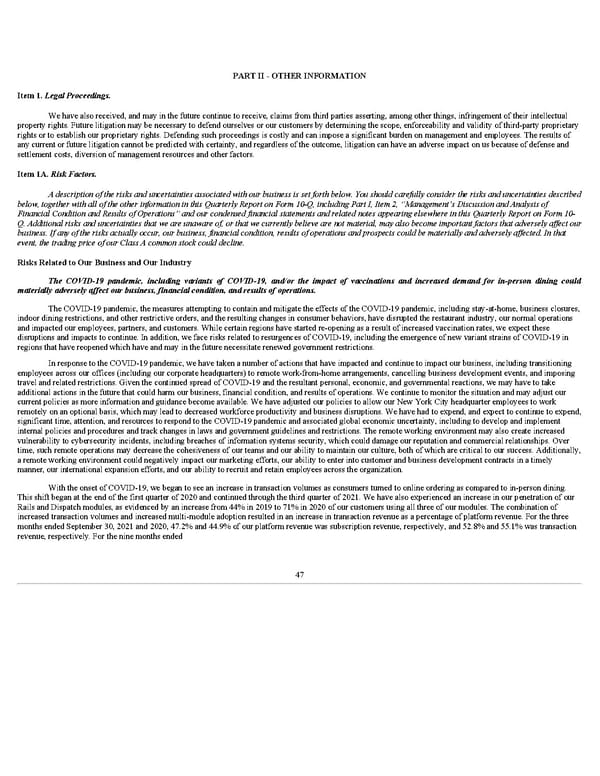PART II - OTHER INFORMATION Item 1. Legal Proceedings. We have also received, and may in the future continue to receive, claims from third parties asserting, among other things, infringement of their intellectual property rights. Future litigation may be necessary to defend ourselves or our customers by determining the scope, enforceability and validity of third-party proprietary rights or to establish our proprietary rights. Defending such proceedings is costly and can impose a significant burden on management and employees. The results of any current or future litigation cannot be predicted with certainty, and regardless of the outcome, litigation can have an adverse impact on us because of defense and settlement costs, diversion of management resources and other factors. Item 1A. Risk Factors. A description of the risks and uncertainties associated with our business is set forth below. You should carefully consider the risks and uncertainties described below, together with all of the other information in this Quarterly Report on Form 10-Q, including Part I, Item 2, “Management’s Discussion and Analysis of Financial Condition and Results of Operations” and our condensed financial statements and related notes appearing elsewhere in this Quarterly Report on Form 10- Q. Additional risks and uncertainties that we are unaware of, or that we currently believe are not material, may also become important factors that adversely affect our business. If any of the risks actually occur, our business, financial condition, results of operations and prospects could be materially and adversely affected. In that event, the trading price of our Class A common stock could decline. Risks Related to Our Business and Our Industry The COVID-19 pandemic, including variants of COVID-19, and/or the impact of vaccinations and increased demand for in-person dining could materially adversely affect our business, financial condition, and results of operations. The COVID-19 pandemic, the measures attempting to contain and mitigate the effects of the COVID-19 pandemic, including stay-at-home, business closures, indoor dining restrictions, and other restrictive orders, and the resulting changes in consumer behaviors, have disrupted the restaurant industry, our normal operations and impacted our employees, partners, and customers. While certain regions have started re-opening as a result of increased vaccination rates, we expect these disruptions and impacts to continue. In addition, we face risks related to resurgences of COVID-19, including the emergence of new variant strains of COVID-19 in regions that have reopened which have and may in the future necessitate renewed government restrictions. In response to the COVID-19 pandemic, we have taken a number of actions that have impacted and continue to impact our business, including transitioning employees across our offices (including our corporate headquarters) to remote work-from-home arrangements, cancelling business development events, and imposing travel and related restrictions. Given the continued spread of COVID-19 and the resultant personal, economic, and governmental reactions, we may have to take additional actions in the future that could harm our business, financial condition, and results of operations. We continue to monitor the situation and may adjust our current policies as more information and guidance become available. We have adjusted our policies to allow our New York City headquarter employees to work remotely on an optional basis, which may lead to decreased workforce productivity and business disruptions. We have had to expend, and expect to continue to expend, significant time, attention, and resources to respond to the COVID-19 pandemic and associated global economic uncertainty, including to develop and implement internal policies and procedures and track changes in laws and government guidelines and restrictions. The remote working environment may also create increased vulnerability to cybersecurity incidents, including breaches of information systems security, which could damage our reputation and commercial relationships. Over time, such remote operations may decrease the cohesiveness of our teams and our ability to maintain our culture, both of which are critical to our success. Additionally, a remote working environment could negatively impact our marketing efforts, our ability to enter into customer and business development contracts in a timely manner, our international expansion efforts, and our ability to recruit and retain employees across the organization. With the onset of COVID-19, we began to see an increase in transaction volumes as consumers turned to online ordering as compared to in-person dining. This shift began at the end of the first quarter of 2020 and continued through the third quarter of 2021. We have also experienced an increase in our penetration of our Rails and Dispatch modules, as evidenced by an increase from 44% in 2019 to 71% in 2020 of our customers using all three of our modules. The combination of increased transaction volumes and increased multi-module adoption resulted in an increase in transaction revenue as a percentage of platform revenue. For the three months ended September 30, 2021 and 2020, 47.2% and 44.9% of our platform revenue was subscription revenue, respectively, and 52.8% and 55.1% was transaction revenue, respectively. For the nine months ended 47
 Q3 2021 10Q Page 52 Page 54
Q3 2021 10Q Page 52 Page 54